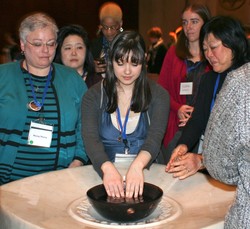After advocacy training at both the Presbyterian and Ecumenical Women’s orientations for the Commission on the Status of Women and a week’s worth of insight from the remarkable women making up these delegations, I was excited to learn how the information I learned during a previous opportunity to attend the annual CTAUN (Committee for Teaching About the United Nations) conference on the theme of “Education IS a Human Right” could be put to work. Much of the information shared at the conference is directly relevant to the Ecumenical Women’s advocacy talking points: access to education, especially reaching young women subject to early marriages and pregnancies; farming, food security and food sovereignty in the ways in which sustainable development education can help promote environmentally friendly farming practices; and transportation in how to support local schools within rural communities, providing alternatives to unsafe travel to and from school.
 The key points that kept appearing at the CTAUN conference again and again serve as a means to reach the CSW advocacy goals by articulating problems and engaging with their solutions. The importance and need for teacher training and the integration of education initiatives with other projects aimed at achieving the Millennium Development Goals, or MDGs, were popular topics. This shows an increasing awareness of the influence education has on other sectors, including development and security. And this whole-picture approach more accurately represents the perspective of women living in rural areas, whose difficulties are not so neatly dividing among policy sectors.
The key points that kept appearing at the CTAUN conference again and again serve as a means to reach the CSW advocacy goals by articulating problems and engaging with their solutions. The importance and need for teacher training and the integration of education initiatives with other projects aimed at achieving the Millennium Development Goals, or MDGs, were popular topics. This shows an increasing awareness of the influence education has on other sectors, including development and security. And this whole-picture approach more accurately represents the perspective of women living in rural areas, whose difficulties are not so neatly dividing among policy sectors.
The problem of increasing the access to education was addressed during one panel at the conference as needing not only quantitative solutions, but qualitative ones as well, especially in rural areas. The panel included both the perspectives a former refugee and the Ambassador from Bangladesh. Both men defined a quality education as one localized within the context of its students—for Ambassador Momen that included ensuring access to school buildings during monsoon season, and for Mr. Sackor it meant promoting a curriculum focused on peace education and conflict resolutions. Both also spoke of the importance of teacher training and securing the access of rural students to professional and qualified adults in the classroom.
Here the question of sustainability begins to play a large role, as it has been a major focus of so many events taking place this week at CSW: How do we make quality education systems sustainable in rural environments? The information shared at the CTAUN conference by Dr. David Hursh about his work with the Earth Institute at Columbia University begins to address this concern. By not only helping to make schools (in his specific case in rural West Africa) more environmentally sustainable by designing a rainwater capture and purification system as well as installing rocket stoves, he spoke of the need to fully take advantage of local human resources. Reaching out to regional universities and building relationships centered around training and scholarship promotes sustainability of a different sort by ensuring the entire system can continue to function long-term. Training and empowering local community members as teachers and leaders, as well as engaging the larger regional community in the responsibility of operating schools ensures they will continue to function without outside aid.
Having had the opportunity of attending the CTAUN conference as well as to help with CSW56 has taught me so much about the way information is shared in order to solve problems both locally and internationally. And the experience of seeing the women of the Presbyterian and Ecumenical Women’s delegations engage in advocacy to bring this information to governments and hold those in power responsible for acting on it has been more than inspiring. It’s wonderful to be able to research and learn about ways to improve the world—but it’s imperative to use those learning experiences in ways that practically implement change.
The picture shows Grace during the Ecumenical Women orientation for the Commission on the Status of Women.